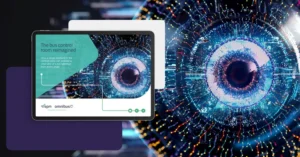Scheduling software has transformed the passenger transport industry, but many experts argue that it takes a mix of skills to achieve the right result.
Scheduling software packages are now well established at any bus operator of any significant scale and they have streamlined and transformed the way in which companies operate their businesses by reducing costs and increasing efficiency. But are these scheduling software packages the solution to all ills? Bus scheduling is an art and a skill that takes time to learn. Many experienced schedulers would argue that software packages need to be used in tandem with some very human skills; in other words, they are an aid rather than the means to an end. These packages can assist the scheduler in creating schedules that are more resilient, but despite advantages in technology, they still need human experience and talent.
Scheduling entails myriad of specialisms
Graham Atkins, network planner at Bournemouth-based Yellow Buses, joined the world of bus and staff scheduling around 2016. His background is as a bus driver, but he admits he was always interested in the way that his day-to-day duties were scheduled. “I’m also a bit computer savvy and enjoy problem solving, so it was inevitable I’d end up as a scheduler,” he jokes.
Atkins admits it took him around two years to get to grips with the complex process and myriad of specialisms that scheduling entails. “We had the Omnibus software, but we were still using pen and paper back then for so many of the tasks,” he says. “I thought we could do more with the software.”
Omnibus software suite is not a new product making bold unsubstantiated claims, but one that has been continually updated and refined for decades by industry experts, many of them with a background in scheduling.
The aim is to provide bus operators with a suite of efficient yet powerful tools that is backed by considerable investment and continued improvement by the Velociti Solutions team. This reflects not only rapid changes in technology but also the evolving requirements of the industry as a whole, for example, with the software providing dedicated export feeds including VDV, TransXChange, ESBR and BODS.
Atkins and his colleagues recognised the power of the Omnibus software suite and the decision was made to embrace its full potential. The software company, says Atkins, were extremely supportive during this transition period.
Scheduling requires human input
“We went to see them and they came to see us and we really got under the skin of it,” he adds. “We thought carefully about what we wanted from the system and we worked closely with them to tailor the suite to what we needed: that has been such a benefit to the business. I can sit at the computer and it generates so many things that are used around the company – ticket machine data, real time information systems, timetables at bus stops and on the website, information for our finance team – all of that flows out of the one system.”
However, Atkins is adamant that a scheduling software solution can only go so far and that human input is also still needed. He says that the art of scheduling is about achieving a fine balance and it requires a real mix of skills, not just careful attention to detail. Atkins points to his background as a bus driver and how his experiences in that role have shaped the way in which he approaches his work as a scheduler.
“You could sit down and use the software to create a set of schedules, but it also needs a human eye to look over them,” he says. “With my driver’s hat on I look at a schedule and think about whether it would appeal to me. I’d say that from the driver’s point of view the scheduler is not the most popular person, so it’s about taking the output from the scheduling system and tweaking it to create something that makes sense for all concerned.”
Akins’s views are echoed by Andy Foster, head of network management at National Express West Midlands. He has over 20 years’ worth of experience of the Velociti Solutions Omnibus software suite in a variety of roles and he describes the skill of scheduling as “an artful science”.
‘Power off’ test
“Scheduling is about creating a timetable that is attractive to the public but it also needs to be cost effective too,” he says. “So, you could create the most wonderfully efficient schedule using the software alone, but it’s more than likely you’d end up with a timetable with headways that just didn’t make any sense to the customer. I’ve always taken the view that you can only get the best from the software when you have a trained scheduler operating it.”
Foster likens this approach to the ‘power off’ test – in other words, if there was a power cut, could the scheduler resort to manual methods if need be?
He continues: “You could put someone in front of the software with no manual scheduling experience, but they just would not have all the answers. The software is there to aid and assist the scheduler. If you look at some of our most intensive services in Birmingham, you could schedule that manually, but it would take a long time to work something out that the computer can do in seconds. You then use the scheduler’s expertise to fine-tune things. That is how you make significant cost-savings and create schedule that works for all parties.”
Foster says that computer packages more often than not supply the right answers for 90% of any given schedule and it is the final 10% where experience comes into play, fine-tuning the output to create the right answer.
Software tailored to operators’ needs
Atkins has had similar experiences where by “continual tweaking” of a schedule he can create an efficient result that meets the expectations of all parties. He adds that this is in part due to the flexibility offered by Omnibus who have fine-tuned the software to the specific needs of Yellow Buses.
“We have a sister company in Greater Manchester and we do their scheduling here,“ he reveals. “The system has been set up to consider the specific needs of that company. We have also had a bespoke build created for outputs that are in a suitable format for use in our timetable books, so there is flexibility there too. You are not just taking a software package off the shelf and having to work around it; there’s a lot of flexibility. The support has also been excellent too – if we have a problem we have quickly received an answer and help.”
Foster also appreciates this flexibility. He has had experience of scheduling packages in the past that were very much tailored to the needs of other countries, in particular the North American market. He says this created some issues for him. In North America and elsewhere it can be a case of one bus and one driver without the more intricate scheduling found at UK operations.
In-depth knowledge of industry
“The Omnibus software suite is very much in tune with the UK market,” he says. “It has been created by people who have that in-depth knowledge of the UK and so it’s set up around how you’d schedule things if you didn’t have a computer in front of you. It’s a more logical way of doing things and some of those other systems just don’t manage to get to grips with those issues.”
Atkins also appreciates the way in which the Omnibus suite of products is tailored to the UK market. “We can run ‘what if’ scenarios,” he says. “The power of the software is such that if my manager comes in with a draft timetable, I can give him answers of how many drivers it will take, how many vehicles it will take, how many vehicle kilometres etc, within minutes, even for the most complex of problems.
“Over the summer we worked our way through a number of ‘what if’ scenarios about a planned change and the software gave us virtually instantaneous answers. We’ve really come away from Excel files and pen and paper and that’s been a tremendous benefit for all concerned.”
Velociti continues to evolve its suite of products to reflect the realities and needs of the passenger transport industry of today. It also aims to make the best even better.
This article was first published in Passenger Transport 2018.



